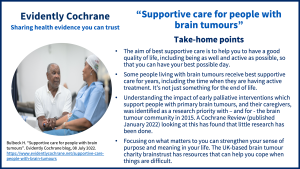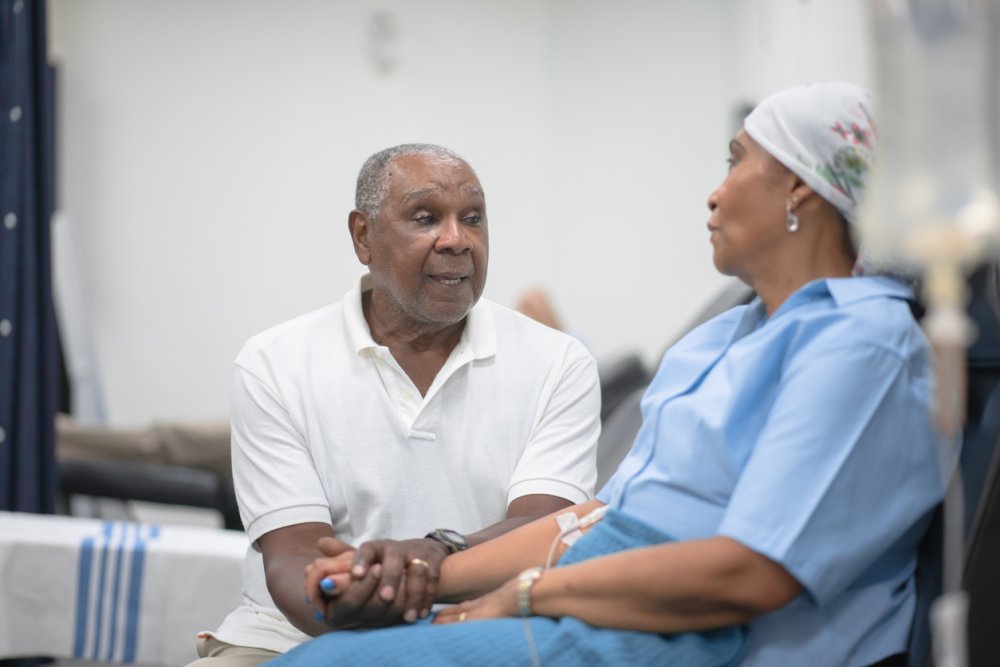In this blog for anyone with an interest in brain tumours, brainstrust Director of Services and Cochrane ReviewCochrane Reviews are systematic reviews. In systematic reviews we search for and summarize studies that answer a specific research question (e.g. is paracetamol effective and safe for treating back pain?). The studies are identified, assessed, and summarized by using a systematic and predefined approach. They inform recommendations for healthcare and research. author Helen Bulbeck reflects on supportive care, what it is, what research tells us about the current state of play with supportive care, and what people living with brain tumours might find helpful.
Take-home points

The impact of a brain tumour diagnosis
We know from our daily interactions with people who are living with a brain tumour that such a diagnosis has a significant impact on people and their caregivers. It is an understatement to say that brain tumours can impair people’s physical, neurocognitive, and social functioning, which can affect the whole family, particularly informal caregivers, who often receive inadequate support. It is a deeper cut than this – the values and beliefs that have made us who we are come into question; our sense of identity and purpose, and our relationship with those around us.
What is best supportive care?
Supportive care is care that begins at diagnosis and an approach that is multiagency, with the patient and their family very much at the centre.
The best approach is one where all the needs of the patient and their family are met for the WHOLE pathway – from diagnosis through to end of life, and, for the family beyond.
The aim of best supportive care is to help you to have a good quality of life, including being as well and active as possible, so that you can have your best possible day. It should be based on a person’s needs and not their prognosis. It can involve:
- managing physical symptoms, such as pain
- emotional, spiritual and psychological support
- social care, including help with things like washing, dressing and eating
- support for your family and friends.
You can receive best supportive care at any stage in your illness; it encompasses the whole pathway from diagnosis to end of life. It doesn’t mean that you are at end of life – some people receive best supportive care for years. You can also have best supportive care alongside treatments, therapies and medicines aimed at controlling your illness, such as chemotherapy or radiotherapy.
What’s the impact of early supportive (palliative) care?
There is evidence in other cancers that providing access to palliative support in the early stages of a person’s illness can help to improve their, and their caregivers’, quality of life. However, it has not been confirmed that this is the case for people with brain tumours. Evidence tends to be anecdotal and therefore is not validated by the research community. Anecdotal evidence suggests that early palliative interventions can lead to:
- Improved understanding of the prognosis
- Improved quality of life
- Reduced depression
- Better symptom control
- Increased survival
- Less aggressive care at end of life.
The evidence on early supportive (palliative) care for people living with a brain tumour
The brain tumour community told us that it was important to understand the significance of early palliative interventions in 2015 when the James Lind Alliance Priority Setting Partnership for Neuro-oncology set out to identify top research priorities for the brain tumour community:
‘Does earlier referral to specialist palliative care services at diagnosis improve quality of life and survival in people with a brain tumour?’
So our Cochrane systematic review Early palliative interventions for improving outcomes in people with a primary malignant brain tumour and their carers (published January 2022) is important. It helps us to understand what the research says about this topic.
Systematic reviewsIn systematic reviews we search for and summarize studies that answer a specific research question (e.g. is paracetamol effective and safe for treating back pain?). The studies are identified, assessed, and summarized by using a systematic and predefined approach. They inform recommendations for healthcare and research. (SRs) are wonderful things. They are what they say they are – they review all the research published to date about a specific topic in a systematic way. They offer a number of benefits:
- deliver a comprehensive overview of available evidence on a given topic.
- help identify research gaps.
- highlight concerns in research studies that can be used to improve future work in the topic area (Eagly and Wood, 1994)
- can be used to identify questions for which the available evidence provides clear answers, saving the need for further research (Chalmers and Glasziou, 2009).
What does this review mean for people who are living with a brain tumour?
This systematic review is an important line in the sand. We looked for studies looking at early referral to specialist palliative care services ‐ or early targeted palliative interventions by other healthcare professionals ‐ for improving quality of life, symptom control, psychological outcomesOutcomes are measures of health (for example quality of life, pain, blood sugar levels) that can be used to assess the effectiveness and safety of a treatment or other intervention (for example a drug, surgery, or exercise). In research, the outcomes considered most important are ‘primary outcomes’ and those considered less important are ‘secondary outcomes’., or overall survival. But, disappointingly, we only identified one studyAn investigation of a healthcare problem. There are different types of studies used to answer research questions, for example randomised controlled trials or observational studies., focusing on a single symptom (cognition) and offering very low-certaintyThe certainty (or quality) of evidence is the extent to which we can be confident that what the research tells us about a particular treatment effect is likely to be accurate. Concerns about factors such as bias can reduce the certainty of the evidence. Evidence may be of high certainty; moderate certainty; low certainty or very-low certainty. Cochrane has adopted the GRADE approach (Grading of Recommendations Assessment, Development and Evaluation) for assessing certainty (or quality) of evidence. Find out more here: https://training.cochrane.org/grade-approach evidence. So, the review tells us that not enough research has been undertaken on early palliative care interventions which support people with primary brain tumours, and their caregivers.
It tells us that research is needed which examines coordinated approaches to overall palliative care provision, and interventions which focus on specific aspects of palliation in this populationThe group of people being studied. Populations may be defined by any characteristics e.g. where they live, age group, certain diseases..
At the moment, we need to accept that there is a lack of certainty around early interventions for palliative care, and the impact these can have, even though we know that in other cancers they can improve outcomes. We need to move quickly to understand this more with balanced population-level research.
For those who need support now
This systematic review indicates research gaps for researchers to address – but what can people living with brain tumours do now?
If you find you are struggling as a patient or a caregiver, then focusing on what matters can strengthen your sense of purpose and meaning in your life. It can help direct the choices you make and can help sustain you when the going gets tough. The most important thing is to be aware of what matters to you. Remind yourself of these things, especially when things are going badly. Some people find it helpful to create a ‘mattering’ list. What would be on your list? Why do these things matter to you?
brainstrust – the brain cancer people has resources that can help you to cope when things are difficult. These include a guide on how to have difficult conversations, how to build a team around you, coaching and counselling, and more information about how to achieve best supportive care. You can reach brainstrust by emailing hello@brainstrust.org.uk or by calling 01983 292 405.
Join in the conversation on Twitter with @bulbeckhelen @CochraneUK and @Cochrane_GNOCG or leave a comment on the blog. Comments are checked by the Editors before they are made public on the blog.
Please note, we cannot give specific medical advice and do not publish comments that link to individual pages requesting donations or to commercial sites, or appear to endorse commercial products. We welcome diverse views and encourage discussion but we ask that comments are respectful and reserve the right to not publish any we consider offensive. Cochrane UK does not fact check – or endorse – readers’ comments, including any treatments mentioned.
Helen Bulbeck is Director of policy and services: brainstrust – the brain cancer people and was a support officer for Cochrane (May 2020 – June 2021).


